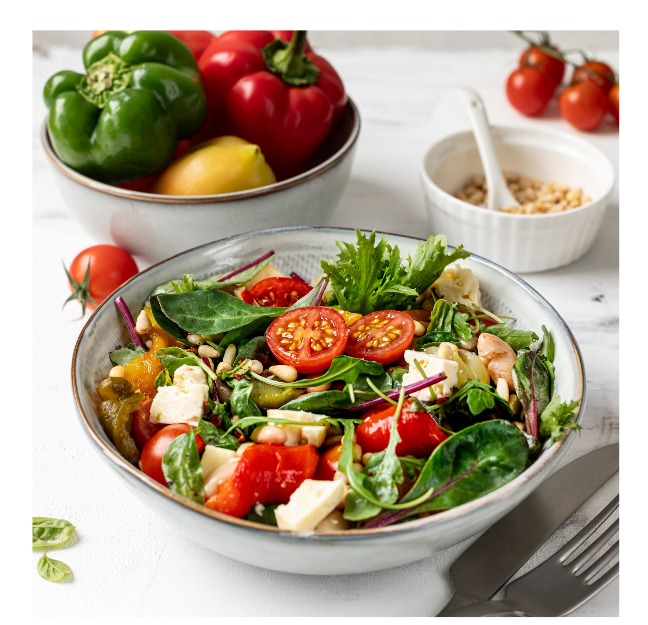5 Best Dinners for Healthy Aging: Nourishing Choices for a Vibrant Life
By: Farah Shaikh
As we gracefully age, the importance of nutrition can’t be overstated. What we choose to put on our plates has profound implications for our health, vitality, and longevity. The right foods can bolster our immune system, enhance cognitive function, and reduce the risk of chronic diseases. This blog will explore eight meticulously curated dinner options that are delicious and rich in nutrients essential for healthy ageing. Packed with fibre, healthy fats, and proteins, these meals cater to our body’s changing needs while satisfying our taste buds.
Best Dinners for Healthy Aging
Quinoa-Stuffed Bell Peppers
Complete protein source.
High in fiber for digestive health.
Rich in antioxidants from colorful vegetables.
Mediterranean Grilled Salmon
Packed with omega-3 fatty acids for heart and brain health.
Excellent source of protein.
Contains essential vitamins and minerals.
Chickpea and Spinach Stew
Hearty vegetarian option rich in fiber.
High in iron for blood health.
Contains anti-inflammatory spices like turmeric.
Zucchini Noodles with Pesto and Grilled Chicken
Low-carb alternative to pasta.
Rich in vitamins A and C from zucchini.
Healthy fats from homemade pesto.
Lentil Soup with Carrots and Celery
High in protein and fiber.
Low in fat, conducive to weight management.
Heart-healthy ingredients.
Stuffed Acorn Squash with Wild Rice and Nuts
Rich in fiber and antioxidants.
Provides B vitamins for energy metabolism.
Sweet and savoury flavor profile.
Shrimp Stir-Fry with Broccoli and Bell Peppers
Low-calorie, high-protein option.
Rich in vitamins C and K from vegetables.
Supports weight management and muscle maintenance.
Baked Sweet Potatoes with Greek Yogurt
High in vitamins A and C.
Contains probiotics for gut health.
Antioxidant-rich, promoting overall well-being.
Conclusion
Healthy ageing focuses on adding life to years through nutrition.
Incorporating these nutrient-dense dinners can enhance vitality and longevity.
Making thoughtful food choices supports a vibrant lifestyle and improves well-being.
1. Quinoa-Stuffed Bell Peppers
Quinoa, often touted as a superfood, is a complete protein packed with essential amino acids. These vibrant, nutrient-dense bell peppers present a beautiful, colourful plate that is as visually appealing as it is nutritious. Stuffed with cooked quinoa, black beans, corn, diced tomatoes, and spices, each bite offers a rainbow of flavors and textures.
Nutritional Highlights:
Complete Protein: Quinoa provides all nine essential amino acids, making it an ideal meat substitute.
High in Fiber: The combination of quinoa and black beans supports digestive health and helps maintain a healthy weight.
Packed with Antioxidants: The colorful array of vegetables assists in reducing inflammation and oxidative stress.
Preparation Tips:
To prepare, cut the tops off the bell peppers, remove the seeds, and lightly roast. Fill them with a mixture of cooked quinoa, black beans, corn, and spices, then bake for about 20-25 minutes. Top with fresh herbs for an added burst of flavor.
2. Mediterranean Grilled Salmon
Grilled salmon is not just a culinary delight but also a nutritional powerhouse. Rich in omega-3 fatty acids, this fish is a cornerstone of the Mediterranean diet, which has been linked to improved heart health and cognitive function. A simple marinade of olive oil, lemon juice, garlic, and herbs elevates the flavor profile.
Nutritional Highlights:
Omega-3 Fatty Acids: These healthy fats are known to reduce inflammation and improve brain health, supporting cognitive function as we age.
High in Protein: Salmon is an excellent source of protein, which is crucial for maintaining muscle mass and strength.
Vitamins and Minerals: This fish is rich in B vitamins, selenium, and potassium, all vital for numerous bodily functions.
Preparation Tips:
To prepare, marinate the salmon for at least 30 minutes and then grill it skin side down for approximately 6-8 minutes per side. Serve with a side of asparagus or a mixed green salad for added nutrients.
3. Chickpea and Spinach Stew
This hearty stew is a delightful vegetarian option that is rich in fiber and iron. Chickpeas are an excellent source of plant-based protein, while spinach adds a wealth of vitamins, particularly A, C, and K. The marriage of spices like cumin, coriander, and turmeric not only enhances the flavor but also offers anti-inflammatory benefits.
Nutritional Highlights:
High in Fiber: Supports digestive health and can aid in blood sugar regulation.
Rich in Iron: Essential for the production of red blood cells and preventing anemia.
Anti-inflammatory Properties: Ingredients like turmeric may help reduce inflammation and improve joint health.
Preparation Tips:
Sauté onions and garlic in olive oil until fragrant, then add chickpeas, diced tomatoes, and a generous handful of spinach. Season with spices and let simmer until the spinach has wilted and the flavors meld. Serve with a slice of whole-grain bread for a fulfilling dinner.
4. Zucchini Noodles with Pesto and Grilled Chicken
Zucchini noodles, or “zoodles,” present a fantastic low-carb alternative to traditional pasta. Tossing them with a homemade pesto made from fresh basil, garlic, pine nuts, and olive oil creates a delicious and nutrient-rich dinner option. Adding grilled chicken not only ups the protein content but also makes this dish more satiating.
Nutritional Highlights:
Low in Carbohydrates: A healthy alternative for those watching their carb intake.
Rich in Vitamins: Zucchini is high in vitamins A and C, contributing to eye health and skin vitality.
Healthy Fats: The pesto provides omega-3 fatty acids and antioxidants, promoting heart health.
Preparation Tips:
Spiralize the zucchini or use a vegetable peeler to create long noodle-like strips. Quickly sauté them in olive oil until just tender. Toss with pesto and top with sliced grilled chicken for a complete meal.




